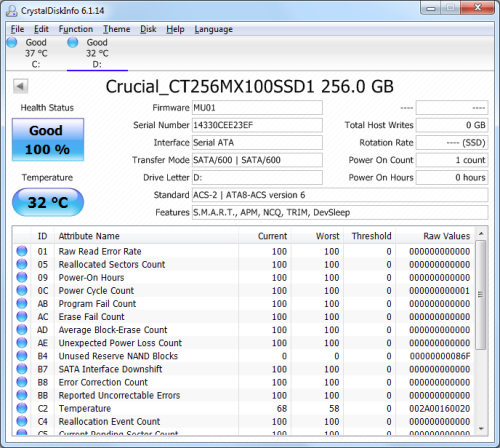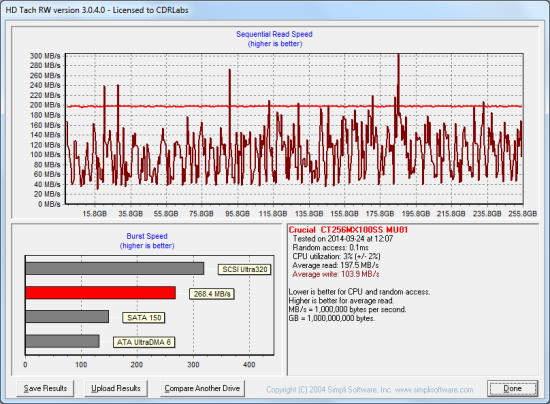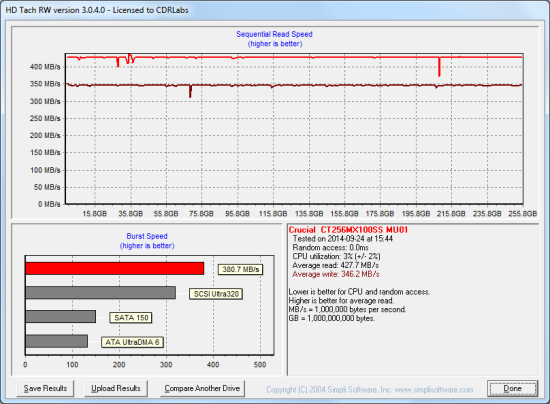TRIM Performance:
While SSD's offer many benefits, there are some downsides to using flash memory. One of the biggest issues people run into is performance degradation. Over time, an SSD will run out of fresh blocks and will have to write over data the file system has marked as deleted. This procedure is very complicated and can slow an SSD's write speeds considerably.
To fix this problem, most manufacturers have added TRIM support to their SSDs. The TRIM command allows an operating system, such as Windows 7, to tell an SSD which data blocks are no longer in use. Using this information, the drive pro-actively erases these blocks and adds them to the free block pool.

To test the MX100's TRIM and garbage collection functions, I first put the drive in a "dirty" state. I used Iometer to fill the entire drive and then ran a random write test for 30 minutes. Looking at the screenshot below, you can see that the MX100's average read and write speeds dropped to 197.5 MB/s and 103.9 MB/s, respectively.

Crucial MX100 - Dirty
To see how well the MX100 could recover, I let the computer sit for a few hours and then reran the test. The drive wasn't able to reach the factory fresh performance shown in our earlier tests. However, its average write speed climbed up to 154.1 MB/s.

Crucial MX100 - After TRIM
Lastly, I used Parted Magic to perform a secure erase on the MX100. With the drive wiped clean, it had average read and write speeds of 427.7 MB/s and 346.2 MB/s, respectively.

Crucial MX100 - Secure Erased
Final Thoughts:
While not the fastest SSD to come through the 'Labs, Crucial's MX100 delivers a lot of bang for your buck. The drive combines Marvell's 88SS9189 controller with Micron's new 16nm 128gb NAND to deliver a fast, responsive computing experience at a price that cost-conscious consumers will appreciate. In our sequential read and write tests, the MX100 was able to read at speeds as high as 555 MB/s and write at speeds in excess of 344 MB/s. It also did surprisingly well in our random write tests, producing more than 78,000 IOPS at low queue depths. Given, these numbers aren't nearly as high as what we saw with Samsung's 840 EVO series SSDs. However, the MX100 is still a huge step up over traditional hard drives.
Despite being budget friendly, the MX100 doesn't sacrifice much, if anything, in regards to features. Along with thermal and power loss protection, TRIM support and active garbage collection, the drive features AES 256-bit full disk encryption and is compatible with both the TCG Opal and IEEE 1667 specifications. The MX100 also uses Native Write Acceleration to spread the drive’s workload across several elements, and technologies like Data Defense and Redundant Array of Independent NAND (RAIN) to guard against corruption and protect your data. Last but not least, the MX100 supports the SATA Device Sleep (DEVSLP) standard which extends the battery life of a device by reducing the drive's power consumption when it's not in use.
The MX100 is available now in 128GB, 256GB and 512GB capacities. Prices on Amazon.com and Pricegrabber currently range from $74 up to $210, with the 256GB version reviewed here going for about $113.

Highs:
- Available in 128GB, 256GB and 512GB capacities
- Excellent sequential read speeds
- Good random read and write performance
- Performs equally well with compressible and incompressible data
- SATA 6Gb/s interface
- Large DRAM cache
- Native Write Acceleration, Data Defense and RAIN technologies
- AES 256-bit full disk encryption
- TCG Opal and IEEE 1667 compliant
- DEVSLP power mode
- Supports TRIM, SMART and active garbage collection
- Thermal and power loss protection
- Ultra-slim form factor
- Includes mounting spacer for 9.5mm applications
- 3 year warranty
- Affordably priced
Lows:
- Lower capacity drives have slower sequential write speeds than other SSDs in their class

